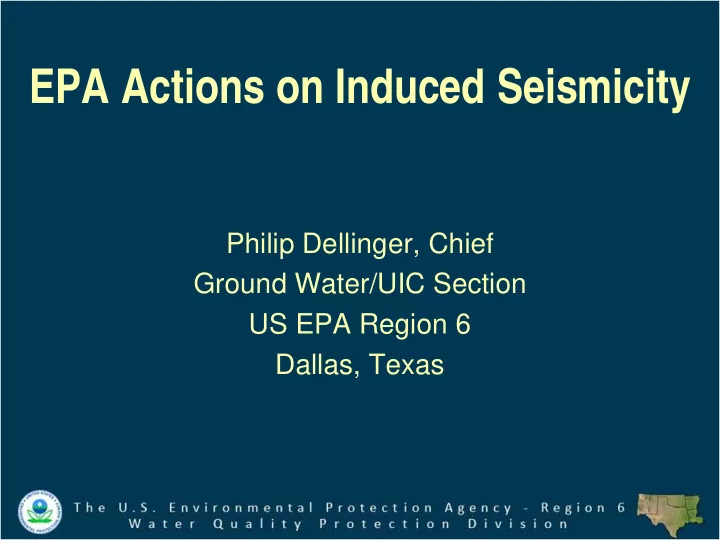

EPA Actions on Induced Seismicity Philip Dellinger, Chief Ground Water/UIC Section US EPA Region 6 Dallas, Texas
Disclaimer These slides and the information contained in them have been prepared by EPA staff for informational purposes only. They should not be relied on for regulatory compliance purposes and do not necessarily reflect EPA’s official policy and legal positions. To the extent any information in these slides is inconsistent with the statutes and regulations identified herein, the statutes and regulations control.
Induced Seismicity Presentation o EPA’s Authority o Our History of Involvement o EPA National Technical Workgroup o Summary Points
EPA’s Authority
Safe Drinking Water Act o Authorizes the Federal Underground Injection Control (UIC) program o Requires protection of Underground Sources of Drinking Water o Requires development of UIC regulations o Establishes options for state UIC program delegation
UIC Injection Well Classes I. Industrial or municipal deep wells o Non-hazardous & hazardous II. Oil and gas related deep wells III. In-situ mining wells IV. Shallow hazardous waste wells (banned) V. Wells not included in Classes I-IV o Geothermal, experimental, and other wells VI. Geosequestration wells
UIC Seismicity Related Regulations o Siting & testing requirements o Class I Hazardous o Class VI Geosequestration o All classes: Director discretion o Class V Geothermal – no specific rules o DOE guidelines in-progress
EPA’s History of Involvement
EPA Involvement – Induced Seismicity o 1990 USGS report in cooperation with EPA o Tracking seismicity events & State responses o North Texas & Arkansas o Response to citizen complaints o EPA/ORD National Hydraulic Fracturing (HF) Study excludes seismicity o HF generally yields microseismicity; -2 to +1 mag. o Established project under national workgroup
EPA National Technical Workgroup
EPA Induced Seismicity Workgroup o Task: Develop technical options to assist regulators in managing seismic risks o Timeframe: June to December 2011 o Region 6 assigned lead o Workgroup representatives from EPA HQ, various EPA Regional offices and State agencies
EPA Induced Seismicity Workgroup o Final product by end of 2011 o Limited to Class II disposal wells o Established six part strategy
Seismicity Workgroup Strategy 1) Literature review 2) Three case studies • North Texas; Central Arkansas; & Braxton Co., West Virginia • Engage researchers • Request specific information from operators
Seismicity Workgroup Strategy 3) Explore reservoir engineering approaches • Industry & regulatory experience • Pressure transient test analysis • Operational injection data evaluation
Log-Log Plot of a Disposal Well Exhibiting Radial Flow Unit slope during wellbore storage period Transition period Derivative flattens during radial flow period
Falloff Test from Suspect DFW Area Disposal Well Flat linear derivative indicating linear flow Derivative decline indicating pressure support Half slope trend on pressure and derivative representative of linear flow due to a fracture
Seismicity Workgroup Strategy 4) Partner with USGS seismologists 5) Develop decision tree • Practical application • Investigate potential regulatory tools • Provide rational approach with options 6) Solicit peer review
UIC Seismicity Summary o Existing UIC authority to address risks o EPA developing a strategy with options for UIC programs to manage seismic risks o Risk assessment of seismic events o Based on actual injection details o Coupled with geologic interpretation o Product based on existing knowledge level
Induced Seismicity Summary Points Arkansas Moratorium area
Questions?
Recommend
More recommend